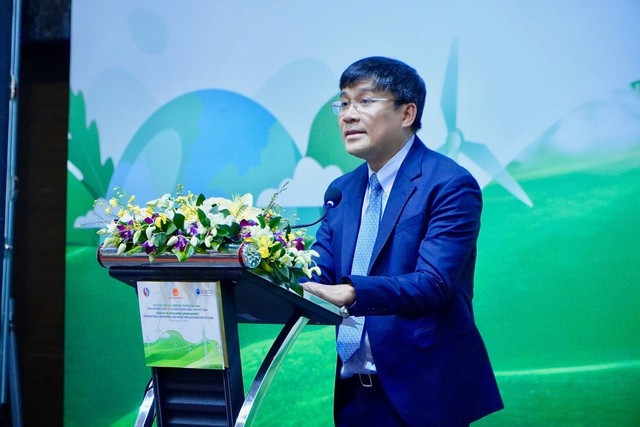

The event, entitled “International experience and policy implications for Vietnam, was co-hosted by the Ministry of Foreign Affairs, the Ministry of Natural Resources and Environment and the Organization for Economic Cooperation and Development (OECD).
In his speech, Deputy Minister Vu outlined that green standards are being shaped and brought into reality in the direction of associating international trade and investment with criteria in carbon emission reduction, sustainable development, labour, and the environment.
Meanwhile, new green linkages and initiatives are being strengthened, which means now is a good time for the country to set up and raise its position in the global green value chain, the official said.
Deputy Minister Vu underlined that the development of the green financial market, especially the carbon market, will be the key to successful green transition. However, this is not an easy job, especially as developing countries lack systematic and quality green standards and criteria, he said.
Meanwhile, Nguyen Tuan Quang, vice director of the Department of Climate Change under the Ministry of Natural Resources and Environment, stated that the nation has issued important strategic documents regarding green growth and sustainable development, including a roadmap for the development of carbon pricing tools, especially regarding the compliance carbon market.
Initially, the nation aims to fast-track the process of building regulations on carbon credit management and greenhouse gas emission quota exchange activities and guiding the implementation of domestic and international carbon credit exchange whilst offsetting mechanisms in accordance with the provisions of law and international treaties before piloting a carbon credit trading floor from 2025, he said.
At the seminar representatives from the OECD hailed the Vietnamese Government's efforts in promoting green growth and sustainable development, expressing their positive impression of the country’s commitment to net-zero emissions given at the 26th UN Climate Change Conference (COP26). They stated that the country boasts great potential in developing a dynamic, high-quality, and efficient carbon market.
Participants noted that the compliance carbon market in the nation is being shaped. So far, Vietnam is home to 150 projects granted 40.2 million carbon credits, thereby becoming one of the four countries with the most registered investment projects under the clean development mechanism.
A number of European businesses and experts stated that the EU's carbon credit exchange system has contributed to reducing emissions whilst promoting sustainable growth in profits without reducing the competitiveness of businesses, while simultaneously creating new jobs and speeding up the building of social climate funds to support those severely affected by carbon taxes and climate change.
The OECD representatives asserted that in order to build a carbon credit trading system, countries should clearly define the goals and limits of the system and ensure legal transparency in related fields.
Representatives from international organizations took time to advise the nation to pay greater attention to enhancing a multi-stakeholder approach; step up linkages among sectors, fields, and levels; encourage the participation of the private sector in the work; and build a carbon database.
They pledged to support Vietnam and to co-operate with the country in boosting the local carbon market.
Experts shared international experience and offered relevant recommendations for the nation in terms of developing the domestic carbon market, including completing relevant institutions and policies, enhancing the overall quality of human resources and infrastructure systems, and promoting international cooperation mechanisms.
Amid the inevitable trend of green transition and low-carbon development towards circular economy, the building, operation, and promotion of the carbon market becomes an increasing important tool, they emphasized.
Source: VOV